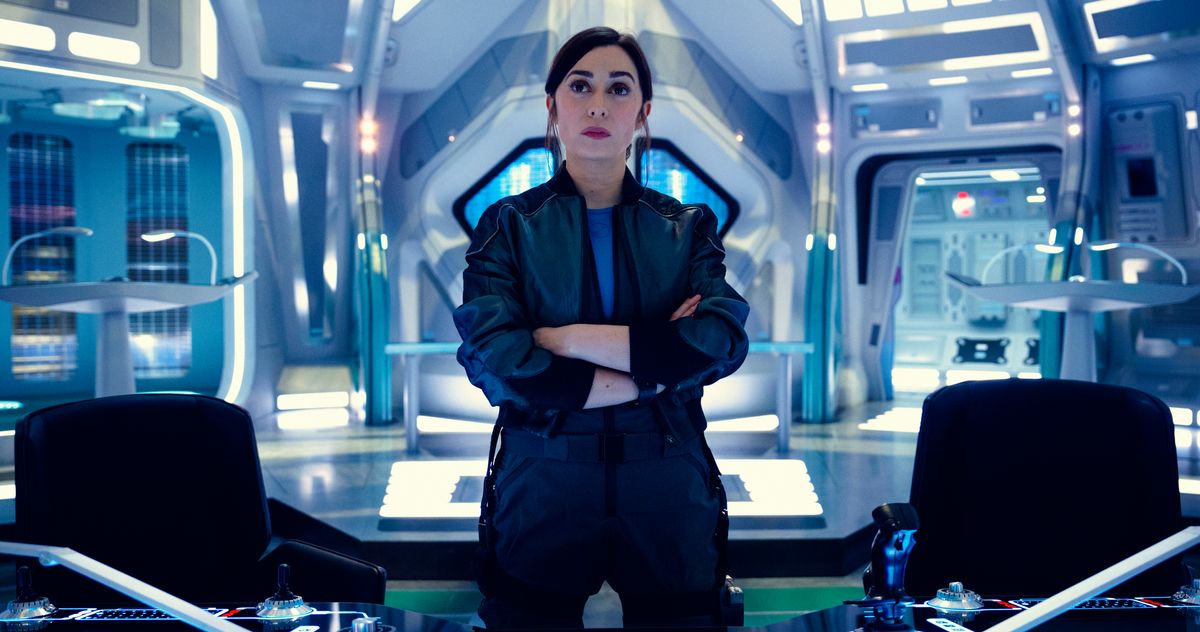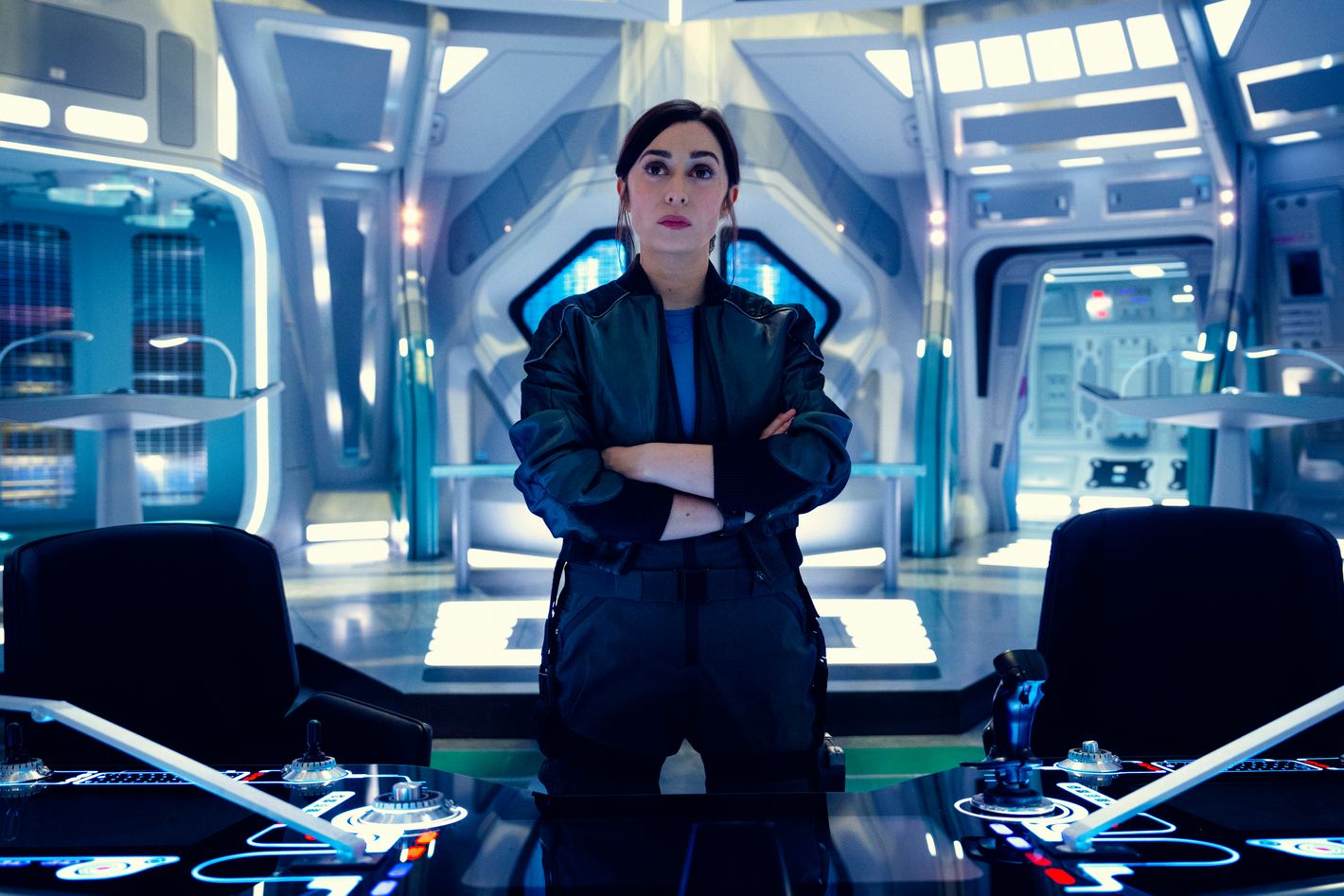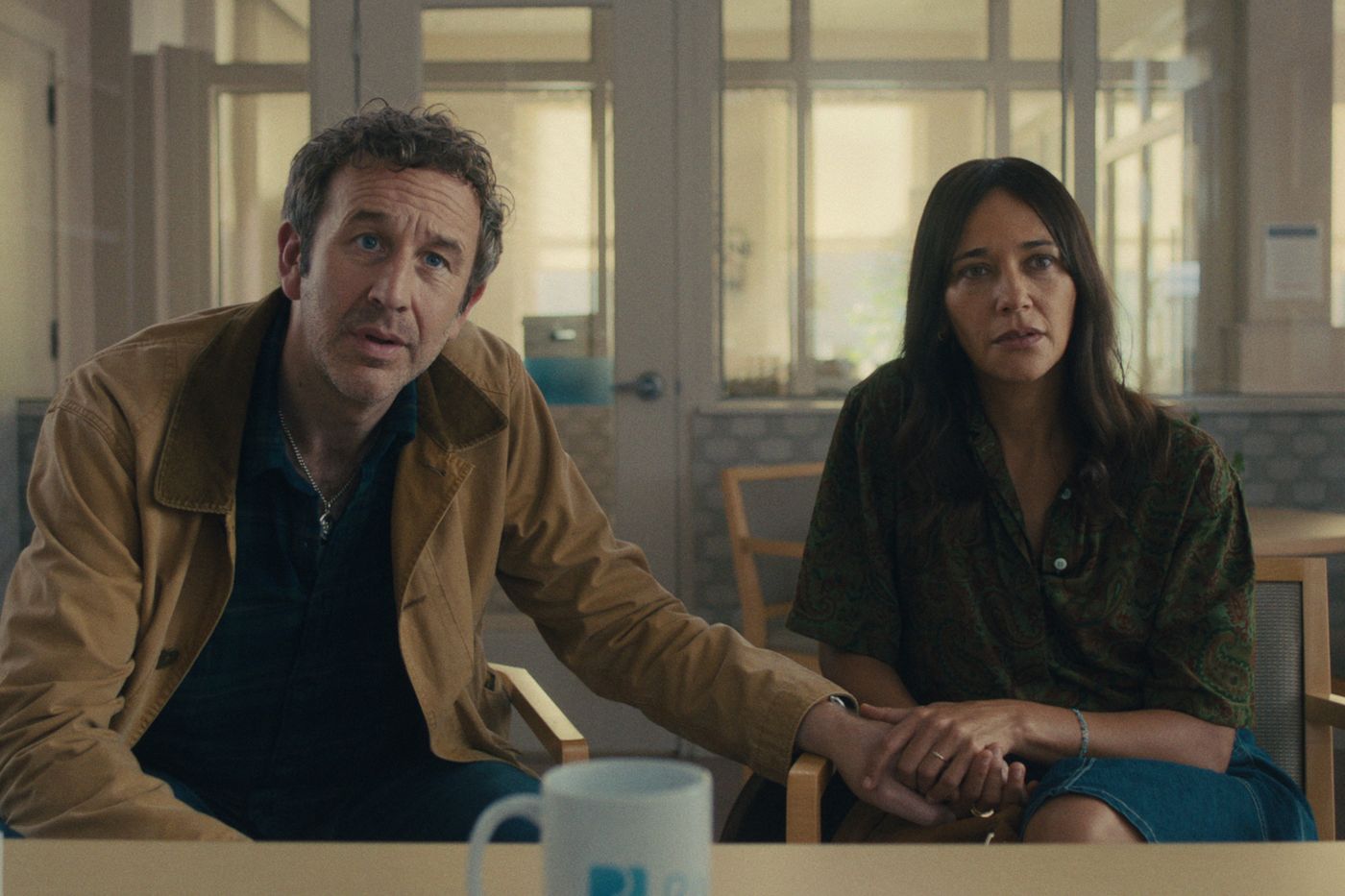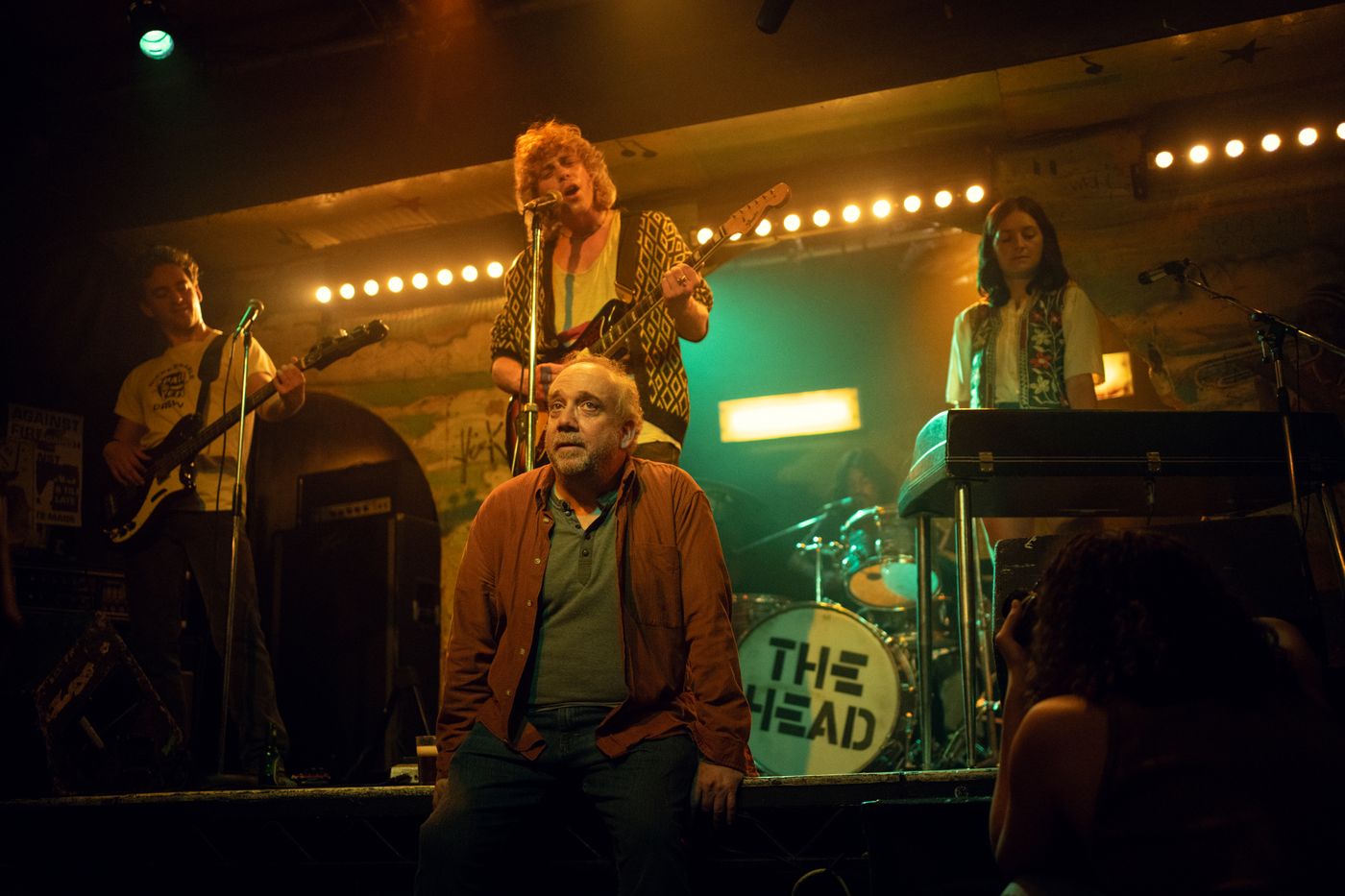There’s Always Enough Nightmare Fuel to Power the Black Mirror Universe
Creator Charlie Brooker explains season 7’s unsettling inspirations and endings, including the show’s first sequel ‘USS Callister: Into Infinity.’


Spoilers follow for all of Black Mirror season seven.
There’s something striking about how Black Mirror, which primarily fixates on near-futuristic tech conceits as a lens through which to unpack human anxieties, has effectively spanned the length of our collective curdling relationship with technology. When the series started in 2011, social media and iPhones were thought to be bright symbols of positive futurism; today, they have wholly consumed us. In many ways, the seventh season is the quintessential Black Mirror experience. The new batch of six episodes, all written or co-written by its creator Charlie Brooker, reflects the full range of how the show has evolved to include new grooves — a mix of the horrific and the comedic, the hopeful and the nihilistic, the archly British and the sourly American. The season tackles gaslighting, biomedical enshittification, and the validity of life within artificially created consciousness. There is also a brand-new type of Black Mirror episode: its first sequel, “USS Callister: Into Infinity,” which builds upon the standout season-four episode about an incel-adjacent man who creates a virtual sci-fi world populated by digitally conscious re-creations of his colleagues for his own pleasure. “All of those things are valid parts of the Black Mirror universe,” says Brooker. “But being that eclectic means you’re always vulnerable to criticism when people say, ‘I preferred it when it was full of British people with bad teeth crying.’”
I was surprised to realize that the first Black Mirror season came out nearly 15 years ago.
Isn’t that terrifying? In television and technology terms, that’s 2,000 years.
Has your approach to the show changed much in those 2,000 years?
It’s weird. Black Mirror was conceived because I’d done a show in the U.K. called Dead Set, which went well for Channel 4, and they said, “What else would you like to do?” My motivation was to do an ideas-based show like The Twilight Zone. I had read about Rod Serling and how he’d use allegory to talk about the preoccupations of the ’50s and ’60s: psychology, the space race, nuclear weapons, McCarthyism. So I thought, Well, what would you do if you were doing it now? You’d do technology. This was around the time of the Arab Spring. It was also around the time when the running joke about Twitter was that it was bland and people would go on there and talk about what they ate for breakfast. It was full of dull narcissists saying, “Look at my sandwich.”
The problem is that now it’s full of exciting narcissists.
Right. It’s exciting in the wrong way. There would be adverts for iPhones that were utopian with interesting-looking people smiling holding these shiny devices. I recoiled from that inherently. I’ve always been a nervous person who expects things to go wrong. The more utopian something is, the more I mistrust it. I wasn’t necessarily thinking of Black Mirror as a show about how technology is bad, because I’m very pro-technology. It’s more that I want to worry about things in a hopefully entertaining way.
There’s a long-standing accusation that the show has become Americanized and more reliant on big Hollywood talent. What do you think about that line of argument?
I’ve heard it. Certainly, when we did the first season, we had no clue this would ever be anything other than a small cult show in the U.K. We had the prime minister fucking a pig in the first episode! And we had actors who were already really well known, from my perspective, though perhaps not internationally: Rupert Everett, Lindsay Duncan, Rory Kinnear, Jodie Whittaker. By the time we did “White Christmas,” with Jon Hamm, the show was already evolving.
When we did the first Netflix season, the very first episode I wrote was “San Junipero.” Netflix never said, “Can you Americanize this show?” Things like that don’t happen at all. We never shot in America before, and we had a conversation about whether you could set this in Britain, and it felt, because we were trying to channel a John Hughes–esque fantasy California from an ’80s movie, it made sense to do that. So I sort of feel like it became an international show then. But in that same season, we had an episode about people being blackmailed in Croydon.
The celebrity faces we have obviously get a lot of attention, but we cast people because they’re fucking good actors. I think people slightly overlook when we’ve put less-known actors in leading roles — or when we’re doing very British stories. I can understand where people are coming from, but I just set episodes wherever I feel it should be set, really. Last season, we did “Demon 79,” which I think is one of the most British things we’ve ever done. In this season, “Bête Noire” and “Plaything” are very British. “Hotel Reverie” is kind of about a British film studio that’s struggling and is trying to interest U.S. streamers. We’ve always made sure to include very British stories in each season, so I’m slightly confused why I’ve seen all that “Give Black Mirror back to the British”–type stuff.
I’m sounding very defensive, aren’t I?
I do think the immediate image people still have about Black Mirror is that it’s acid and dark by default. But “San Junipero” did feel like a turning point where you started writing more overtly humanistic episodes. The first episode this season, “Common People,” revolves around a couple, played by Rashida Jones and Chris O’Dowd, who are financially beholden to a biotech start-up when one of them suffers an aneurysm and becomes mortally dependent on their technology. Was there a specific idea that inspired it?
It’s a possibly deceptive episode where it starts out as if it’s an indie comedy, but the premise turns out to be quintessentially Black Mirror in that it’s pitiless in terms of how it treats the characters. It was a few different ideas glommed together. I’ve been thinking about doing a story where somebody’s either dead or nearly dead and a loved one brings them back — but there’s a cloud-based element to how it’s done. I was also thinking about how I’ve often been struck by how you’d be listening to a podcast and the hosts would suddenly go into an ad sales pitch seamlessly. Like, I was listening to a crime podcast once and the host was describing how the police had found a mutilated body somewhere and then pretty much went straight from that into pitching a service that delivers fresh vegetables to your door. And then, walking around in the world, you can’t help but notice that.
I can’t drive, and when Uber came along, it was miraculous for me. But, of course, it obviously hollowed out the whole taxi industry, and now the app has become almost unrecognizable: There are five different flavors of Uber you could book, and they don’t show up when they say they’re going to. I’ve also got an Amazon Alexa device in my house. We put it in the kitchen and use it almost as an intercom; it’s one of the ones with a screen that shows a cycle of photographs of my family. Then, suddenly, it started showing adverts as well, and you can’t switch them off. So you’re aware that there’s a kind of intrusion and degradation happening, and I wanted to write an episode that hopefully channels the general sense of being squeezed that everyone is feeling.
I saw Rashida’s character as a stand-in for people who have to pay really high prices for treatment they need to stay alive. It made me think about Luigi Mangione and forms of resistance. Overwhelming corporate power is a major theme across the show, but Black Mirror characters often don’t take radical action to break the system.
I don’t know why that is. Maybe it’s part of the DNA of Black Mirror. There’s an undercurrent of sadness, even when we’re doing comedic episodes. Maybe it’s because I don’t believe those fables and stories. Maybe that’s a failure of imagination on my part.
“Bête Noire,” in which a food scientist (Siena Kelly) is creeped out by an old classmate (Rosy McEwen) who joins her workplace, is a good example of a grim episode with a comedic feel. I know it ultimately turns on this notion of parallel universes, but what stood out to me is when Kelly’s character is trying to fact-check something on the internet, only to find that the internet has erased the truth. I find it quite horrific that we’ve basically outsourced our verification of reality to Google.
Oh, you’re right about that, but I approached it more as a gaslighting story. Gaslighting has become a phrase that now everybody knows, but it’s a very useful phrase to describe the maddening, claustrophobic, and discombobulating experience of being told that up is down and one is two and east is west and all the rest of it. The idea just struck me one day: “What if you had a story about somebody who is gaslighting another person, and they’re doing it by actually changing what reality is?”
Obviously, it’s played as a romp, but it’s going after the sense that reality as a whole feels like it’s under assault. We’re living in a time where there are competing versions of reality, and you’re basically being encouraged to pick a side. And I don’t know how you get back from that.
“Hotel Reverie” has a natural relationship with last season’s “Joan Is Awful” in that it feels like you’re working through how traditional artistic production — in these specific cases, Hollywood filmmaking — might be changed by artificial intelligence. “Joan Is Awful” takes a dim view of AI and digital replication of actors in the entertainment business, but as you mentioned, you’re fundamentally pro-technology. That comes through in how the construct of “Hotel Reverie” is basically The Matrix as experiential theater, where a modern-day movie star (Issa Rae) stars opposite an artificially re-created early-Hollywood starlet (Emma Corrin) in a virtual world. What was the genesis of the idea there?
Originally, it was going to be about somebody who’s thrown into the lead of a James Bond movie, and it would’ve been a comedy. But I also wanted to do something, perhaps more horror-oriented, about a character who restores an old bit of film and realizes they could talk to the person in the film. So those two ideas glommed together to make “Hotel Reverie,” which ended up being a romance that gets you into some strange existential spaces.
“Hotel Reverie” also connects with “San Junipero” and “Striking Vipers” over the notion of virtual worlds being space to discover and explore queerness. What keeps drawing you back to that idea?
This possibly sounds disingenuous, but I approach those episodes in a fairly pragmatic way. “San Junipero” first featured a heterosexual couple, and the twist was really about them being old people in the present. Then came the thought, “What couldn’t they have done in 1987?” That eventually became, “What if it’s a same-sex couple that got married?”
That’s how I approach things as a storyteller. I’m just writing, “Here’s what I think a person would do in this scenario.” I’m a heterosexual white middle-age guy from London, so that’s not my lived experience. Which means that, for all three of those stories, the best I can do is try and make them very accessible to a wide audience while also being very specific.
One of the major threads this season, and it’s present throughout all of Black Mirror, is this question of whether digital consciousness has personhood. You can see it in “Hotel Reverie” with Corrin’s character. You can somewhat see it with the Thronglets, the video-game creatures in “Plaything,” but it’s especially prominent in “USS Callister: Into Infinity.” Why is that interesting to you?
I think I’ve always been interested in what’s real, what’s truth, what’s an authentic experience, and also, what you project onto something. With “USS Callister,” sometimes I’ve seen people saying: “Robert Daly did nothing wrong. They’re not real, they’re just computer.” And I just don’t know how you can watch that episode and believe that. Will an AI ever be conscious enough to feel pain and heartbreak? That’s one for an expert beyond me, but I wouldn’t be surprised if, at some point, the answer is yes.
It’s also a delicious question to play with as a storyteller, in that there you’ve got people who the world views as disposable entities mainly because they don’t know any better. Whereas to them, they are completely and utterly real. That’s something that we do all the time in a way to people who are on the other side of the screen.
Yet the humanism of that idea is so complicated by the ending. Where Nanette (Cristin Milioti) ends up is kind of a nightmare: Flesh-and-blood Nanette is basically brain-dead, and clone Nanette takes over her body.
Well, we did have a different ending originally that was more Wizard of Oz, where it was a little more about her going home and saying good-bye to everyone. But frankly, that would’ve been a little too twee. I have to credit Toby Haynes, the director, who said, “Come on. That’s not very Black Mirror.” It felt better to keep them in a comically bad, very Black Mirror situation.
I enjoyed how you brought back Jesse Plemons, one of the greatest actors working today, as Daly only to shove an ax into his head.
Well, why not?
Why did you want to make “USS Callister: Into Infinity” your first sequel?
When we were setting up the first one, we weren’t necessarily thinking that we were going to do a sequel, but after making the episode, there were enough things being established that we started going, “Oh, it’d be fun to continue that story.” We had this backstory where we thought that Walton (Jimmi Simpson) had exploited Daly. Walton mentions this in the first one when he apologizes to everyone. And the thing about Daly is he’s weak and wounded. He’s in a shit situation when we meet him; he has been exploited and duped and mistreated, but he doesn’t deal with any of that in a mature way. Obviously, he’s in a nightmare scenario, but that makes him an interesting villain figure.
Going into this episode, we wanted to play with there being two versions of these characters. Two versions of Nanette, two versions of Walton, two versions of Daly. There is the version of Nanette who’s risen to a challenge, because the version of her inside the game is bold and capable and has proven herself and is vulnerable but driven and smart. But the version of her on the outside when we first meet her is sort of a bit of a flibbertigibbet that doesn’t know what’s going on and is nervous and anxious. The version of Walton inside the game is much more … well, he was broken in the first one, and now he’s more humble and empathetic than the version of him on the outside, who is a vain old prick who hasn’t had his comeuppance yet.
And then you’ve got Daly. It was important to us that we didn’t just have Daly come back and have a redemptive arc. You see him as almost a prequel version, this desperately lonely figure in a bad situation. Nanette knows she can’t trust him. It was an interesting way of bringing the character back that wasn’t just having him pull the mask off and go, “Actually, I’m nice now,” or something. It felt like we were maintaining the arc of the original and also showing you something different. It is, in a weird way, almost like doing an origin story.
“Plaything,” which isn’t quite a sequel to “Bandersnatch” but has some overlapping characters, feels like the most traditional Black Mirror episode this season. What were you thinking about with that episode?
I wanted to do a story about a simple creature in a game that was given some intelligence and then is left running for decades. I read something about somebody who left SimCity or Civilization or something like that running on a computer for years. I was a video-game journalist in the ’90s, so it was a world I knew. Once, I was given a game called Creatures to review, which they said was an artificial life simulator. I played The Sims as well, like everyone else. You can quickly bond with these things and feel really guilty about it. I had a Tamagotchi that I left in a pair of trousers and it went in the washing machine and boiled to death, and I felt awful because of what you invest in this thing.
I was also interested in the notion of something like an iOS upgrade for humankind that basically gets unleashed into the world. We originally had one more shot where you saw the police officer waking up and he’s smiling, but I cut it out at the last minute because I felt it was making it too unambiguous. Maybe I was wrong, but I don’t know. But I’m ambiguous on whether that’s a good thing. Everything Peter Capaldi’s character explains is held to be true in the episode. He says, “This is going to be an upgrade that will allow us to become this intertwined, ultra-communicative superintelligence that’s benevolent.” He also suggests it doesn’t overwrite anything on the inside. He describes this blissful process. So that was the idea. I was just sort of thinking, Well, that’s quite obviously quite a spoonful of medicine to take, but if that was offered to us, would that be a good thing or a bad thing? Would we lose our humanity? I don’t know.
“Eulogy,” about a man (Paul Giamatti) who enters virtual re-creations of old photographs to reexplore his memories of a lover from decades ago, is probably my favorite episode from the season, but I’m a sap. You’re in your mid-50s. Are you more prone to looking back over the sum of your life?
Unfortunately, I have probably more past than future, so it’s partly that. To be honest, we do play with nostalgia a lot on the show. “Eulogy” was co-written with Ella Road, who’s a great writer here in the U.K., and it’s kind of a companion piece to “Be Right Back” and “The Entire History of You” in that it’s about someone who’s no longer there. We were talking about memory and photography, and how an individual’s take on memory might deceive them in terms of who they feel is the villain in their life.
So, my dad sadly recently passed away, and I found myself in the surreal position of having to read the eulogy at his wake just after doing this episode. We collated a load of photographs for a slideshow that we were showing at this event, and it is striking how few photographs you’ll have pre-2010. Unless you were an avid photographer, you might have three, four, five photos at best. Very few. And the images that are there are imperfect. They’re blurry. People’s eyes are closed. They’re inelegantly framed, or they’re overexposed. One of the other things I was channeling was the Get Back documentary, where Peter Jackson and his team used technology to bring the past back to life in a way.
It’s about stepping back into those half-remembered moments. You’ve got this high-tech tool colliding with this old form of media that’s also bound up in his memories and music. And then that led to the notion of, what if he hasn’t got these memories anymore? What if, in an act of anger, he’s basically deleted her face from his memory by vandalizing these photos?
There are things in that episode that couldn’t happen now. They lose touch with each other, which would be very hard to do. She wrote him a letter on paper that he never saw. It’s kind of a love story, but at a slightly different register. He falls back in love with her, but by the end, he realizes that he’s been punishing her in his head, which is tragic because he fucked it all up.
I’m not sure how that episode will go down with people. I love it. You get a slight nervousness that what people want from Black Mirror is everybody rolling around on the floor absolutely destroyed at the end or that somebody’s dead or in jail. There isn’t a villain, really, in that episode. So I’m glad that it’s resonating with you.
How many more Black Mirrors do you think you’ll make?
It depends how long the world lasts. I guess, as long as I can keep finding it interesting, and people will keep wanting to watch it, I’ll keep going until the world stops — or I stop.
Related








